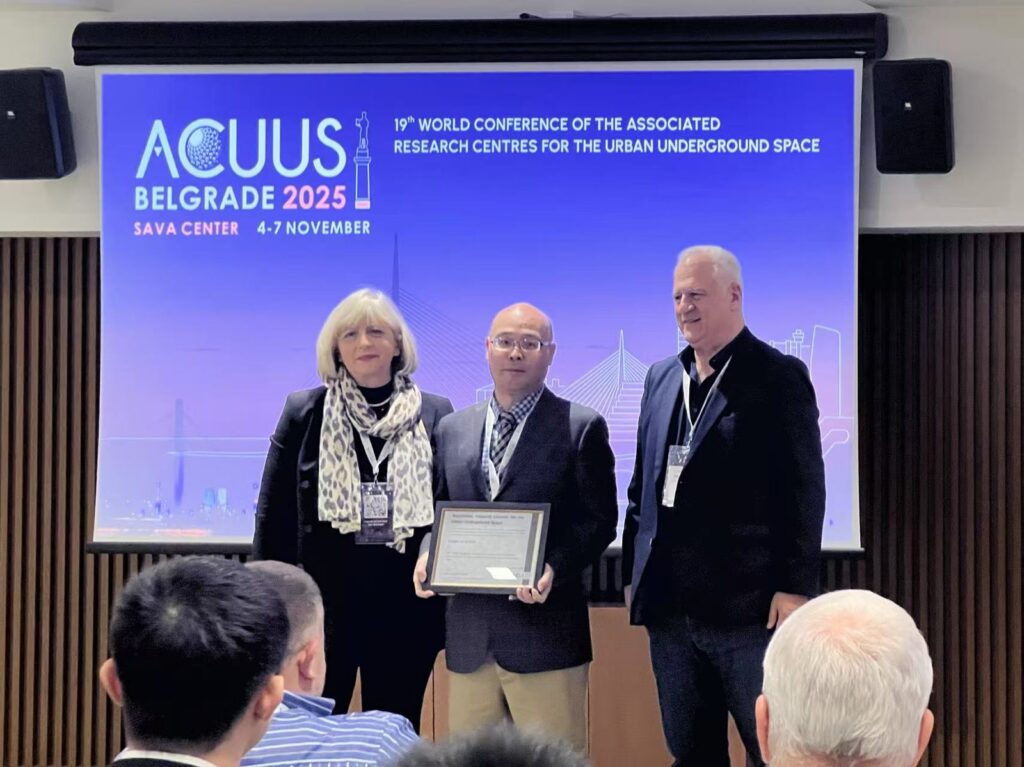ACUUS is proud to announce that Prof. Fang-Le Peng has been named ACUUS Fellow at the General Assembly Meeting that was held in Belgrade in November, during the latest ACUUS Conference that was held there. The ACUUS Fellow distinction recognizes members whose long-standing dedication has significantly shaped the global dialogue on urban underground space. This is an honor reserved for individuals who have made exceptional contributions to the advancement, visibility, and mission of our organization.
The ACUUS organisation congratulates Prof. Fang-Le Peng on this well-deserved recognition. His dedication, leadership, and lifelong commitment to advancing underground space research embody the true spirit of the ACUUS Fellow distinction.

About Dr. Fang-Le Peng
Dr. Fang-Le Peng is a Full Professor and Director at the Research Center for Underground Space at Tongji University, holding a Ph.D. in Civil Engineering from the University of Tokyo, MSc and B. Eng degrees in Underground Architecture and Engineering from Tongji University. A distinguished academic and leader in underground space research, Dr. Peng has led a team that has published over 60 scientific papers on urban underground space use and planning. His group has provided crucial technical support for major urban planning initiatives across key cities in China, shaping best practices in UUS development.
A Legacy of Contributions to ACUUS
Dr. Peng’s involvement with ACUUS spans nearly four decades and reflects a deep-rooted commitment to the mission of the organization. His relationship with ACUUS began in 1988, when he participated in the successful organization of the 3rd ACUUS Conference at Tongji University as a young master’s student under Prof. Xue-Yuan Hou, Chairman of the event. This early experience laid the foundation for a lifelong journey of engagement and leadership within the ACUUS community.
From 2005 onward, as Director of the Research Center for Underground Space, he ensured that his institution remained consistently active in ACUUS conferences, contributing both scientific insight and organizational support. His leadership played a significant role in strengthening the visibility of ACUUS within the academic and professional underground space community in China. Later, upon assuming a formal leadership role within ACUUS in 2016, Dr. Peng became instrumental in expanding the organization’s reach throughout China. Through his strategic vision and persistent efforts, ACUUS experienced a highly successful membership campaign in the country, greatly enhancing its presence and influence across Asia. His sustained contributions reflect not only dedication but also a unique capacity to connect local expertise with the global ACUUS mission.
A Driving Force for Global Knowledge Exchange
Over the past two decades, Dr. Peng has consistently demonstrated a profound commitment to international collaboration and knowledge sharing—values at the core of ACUUS. He has actively promoted ACUUS and its activities across China, ensuring that the organization’s conferences, initiatives, and research outputs reach a broad audience of planners, engineers, academics, and decision-makers. His efforts have served as a bridge between Chinese practitioners and global experts, helping foster a continuous, mutually enriching exchange of ideas on the sustainable use of underground space.
Beyond organizational growth, Dr. Peng has played a key role in cultivating the next generation of underground space professionals. Through his educational initiatives, mentorship, and research guidance, he has supported young scholars in developing their expertise and engaging with the international UUS community. His vision emphasizes not only scientific progress but also the creation of a vibrant, globally connected network of specialists devoted to shaping the future of underground urban development.